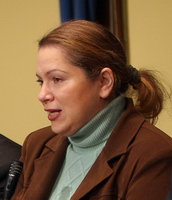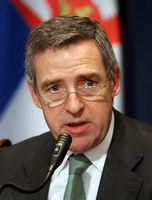- Serbia
Get to know Serbia
- Citizens
Culture and science
Health services
Pension and disability insurance
- Business
Employment
Economy
- Media
- Government
- Contact
Keep in touch
Contact form
Back
Keepin touch
Whether you have a question, comment, suggestion or any problem in the purview of the government, send us your message and we will try to respond as soon as possible. If your problem is not in our purview, we will forward your message to the relevant institution.
Q:
A:
Capacity building project for Ministry of Economy and Regional Development
Belgrade,
18 December 2007
Serbian State Secretary for international economic relations at the Ministry of Economy and Regional Development Jasna Matic presented today a twinning project which aims to strengthen the structure, institutional capacities, activities and procedures of this ministry in the area of trade.
The project for building capacities of the Ministry of Economy and Regional Development in designing, negotiating and implementing trade policy and negotiating international agreements is being implemented jointly by the Ministry of Economy and Regional Development, as partner and beneficiary, and the German Ministry for Economic Cooperation and Development.
Speaking at the press conference, Matic said that the EU is providing expert assistance through the German ministry to Serbia so that the country may accelerate the process of joining the WTO.
She said that expert help is also intended for creating a free trade zone with the EU and harmonisation of laws in the area of foreign trade with EU legislation.
The project is worth €1.8 million, and during its implementation the Ministry of Economic and Regional Development as direct beneficiary, should build capacities for negotiating and implementing trade policy and international trade agreements.
Matic said that German assistance is very important since in 2008 Serbia intends to conclude the process and negotiations for joining the WTO, while in January it is expected that the Stabilisation and Association Agreement (SAA) with the EU will be signed.
According to Matic, the ministry plans to amend the law on foreign trade, to harmonise it with EU legislation. It also plans to simplify import and export procedures, reduce the number of documents required and make the process of issuing licenses more transparent, in which German help will be invaluable.
Speaking at the press conference, Matic said that the EU is providing expert assistance through the German ministry to Serbia so that the country may accelerate the process of joining the WTO.
She said that expert help is also intended for creating a free trade zone with the EU and harmonisation of laws in the area of foreign trade with EU legislation.
The project is worth €1.8 million, and during its implementation the Ministry of Economic and Regional Development as direct beneficiary, should build capacities for negotiating and implementing trade policy and international trade agreements.
Matic said that German assistance is very important since in 2008 Serbia intends to conclude the process and negotiations for joining the WTO, while in January it is expected that the Stabilisation and Association Agreement (SAA) with the EU will be signed.
According to Matic, the ministry plans to amend the law on foreign trade, to harmonise it with EU legislation. It also plans to simplify import and export procedures, reduce the number of documents required and make the process of issuing licenses more transparent, in which German help will be invaluable.
Head of the European Commission delegation to Serbia Josep Lloveras said that the SAA envisages creation of a free trade zone between Serbia and the EU within a period of six years, so that Serbia will gradually reduce customs on import of industrial and agricultural products from the EU.
He said that Serbia is now a member of the CEFTA which will make it more attractive for foreign investors, and is moving towards full WTO membership which will integrate it into international trade regulations.
Lloveras said that integration into international trade means Serbia will have to reduce its foreign deficit, avoid protectionist pressures and eliminate obstacles.
He said that all this will result in reform of the Serbian market, cheaper production and a higher employment rate.
The twinning project was launched in November and will last two years. It is being financed by the EU and led by the European Agency for Reconstruction.
He said that Serbia is now a member of the CEFTA which will make it more attractive for foreign investors, and is moving towards full WTO membership which will integrate it into international trade regulations.
Lloveras said that integration into international trade means Serbia will have to reduce its foreign deficit, avoid protectionist pressures and eliminate obstacles.
He said that all this will result in reform of the Serbian market, cheaper production and a higher employment rate.
The twinning project was launched in November and will last two years. It is being financed by the EU and led by the European Agency for Reconstruction.
-
 Belgrade, 22 January 2025
Belgrade, 22 January 2025Egypt one of Serbia’s closest partners on international stage
-
 Belgrade, 9 July 2024
Belgrade, 9 July 2024Support for 104 associations in diaspora that preserve Serbian language, culture
-
 Belgrade, 15 April 2024
Belgrade, 15 April 2024Competition for StarTech grants open until 31 May
-
 Belgrade, 2 October 2023
Belgrade, 2 October 2023Serbia respects Resolution 1244 and will do everything to preserve peace
-
 Belgrade, 13 September 2023
Belgrade, 13 September 2023Day of Serbian Unity to be celebrated outside borders of Serbia, Republika Srpska for the first time
-
 Belgrade, 8 August 2023
Belgrade, 8 August 2023RSD 24.2m in state aid paid out to citizens affected by storm
-
 Belgrade, 17 June 2023
Belgrade, 17 June 2023Belgrade is doing everything to preserve peace in Kosovo and Metohija
-
 Belgrade, 15 June 2023
Belgrade, 15 June 2023Slovenia will continue to support Serbia on its way to EU
-
 Belgrade, 5 May 2023
Belgrade, 5 May 2023Emergency measures, tightening of conditions for possessing weapons
-
 Belgrade, 3 May 2023
Belgrade, 3 May 2023Three days of mourning in Serbia over tragedy at Vladislav Ribnikar primary school


